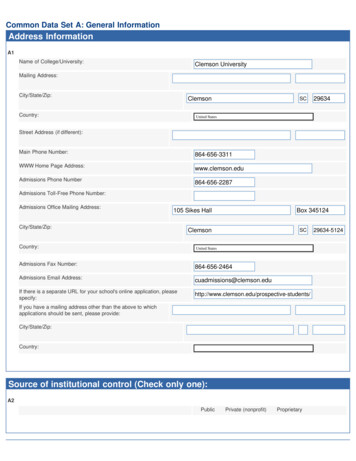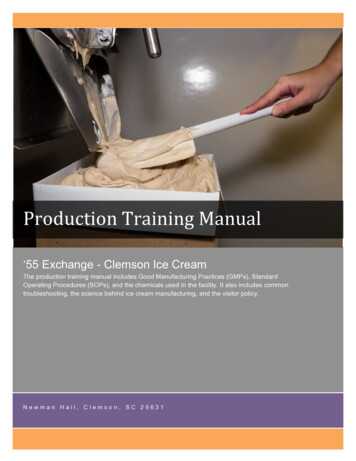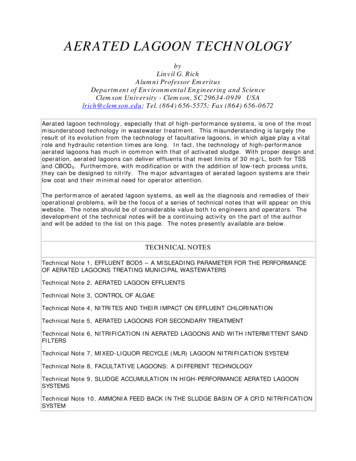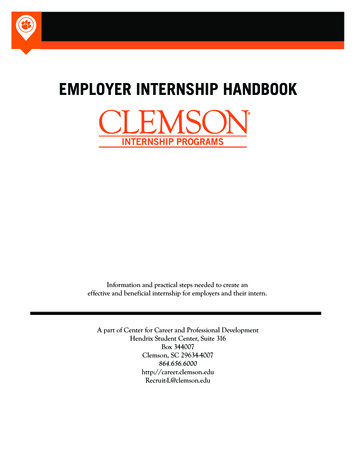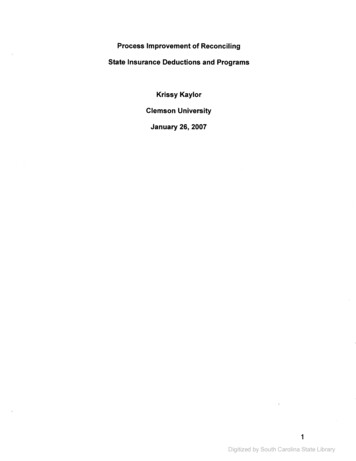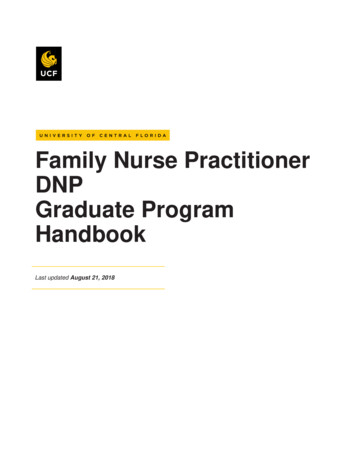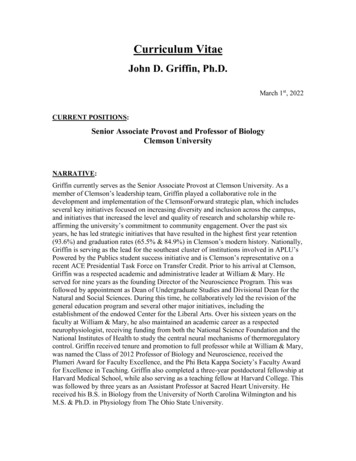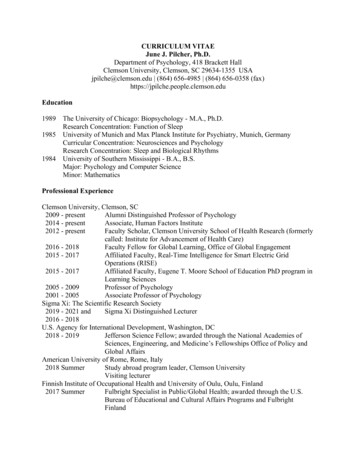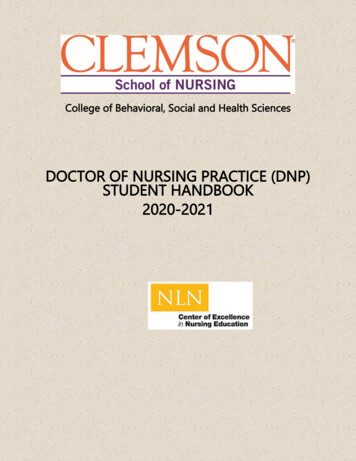
Transcription
College of Behavioral, Social and Health SciencesDOCTOR OF NURSING PRACTICE (DNP)STUDENT HANDBOOK2020-2021
Table of ContentsSection I: The School of NursingThe School of Nursing Overview4National Accreditation and Statement of Equal Opportunity5Student Disability Services5SON Civility Statement5School of Nursing Organizational Chart6CBSHS Important Contact Numbers7The School of Nursing: Mission, Vision, Goals8Section II: Purpose, Objectives, and Curriculum InformationThe Doctor of Nursing Practice Program Overview9Admission Requirements10State Reciprocity10Curriculum Plan of Study12Course Descriptions12DNP Essentials14Practice Hours18Dropping a Course18Guidelines for Expressing Student Concerns18School of Nursing PhD & DNP Prepared Graduate Faculty18Section III: Program Information, Policies and ProcedureAdvisement19Graduate Academic Integrity Policy19Graduate Academic Integrity Statement20Charge of Academic Integrity Violation Form21Grading & Other Policies for Graduate Program22Professional Practice Dress Code23Netiquette & Civility Statement24School of Nursing Social Media Policy26Policy for Use of Personal Digital Devices in the Clinical Area27Health Insurance Portability and Accountability Act28Multistate Licensure for Registered Nurses23Student Records and Confidentiality28Official Name Change Procedure28Financial Assistance28Admission and Continuous Enrollment Requirements Cover Sheet29Admission and Continuous Enrollment Requirements Checklist30Student Information/Personal Health History FormUnderstanding of CU Alcohol/Drug Policy and Screening31Student Policy Governing Use and/or Abuse of Drugs and/or Alcohol33Drug and/or Alcohol Abuse Policy Procedure34ii32
Section IV: School of Nursing Facilities, Resources and Student OrganizationSullivan Center for Nursing and WellnessConnection to the Clemson University Libraries Catalog36Student Representation36Completion of Degree Requirements for Graduation3636Section V: Completion of Degree RequirementsGraduate Degree Curriculum Plan of Study (GS2)37Continuous Enrollment & Leave of Absence38Final Project Approval (GS7D)39Application for Graduation & Ordering Diploma39Professional Convocation39Graduate Steps to Success40Tips for Working with Faculty40Section VI: DNP Project and FormsDNP Portfolio and Candidacy41DNP Essentials and Links to Courses42DNP Project Overview43DNP Project Guidelines44DNP Project Chair Checklist45DNP Project Defense Guidelines46DNP Translational Research Symposium Poster Information46DNP Project Committee Guidelines47DNP Project Request for Appointment of Committee48DNP Project Student/Faculty Contract49DNP Project Topic Approval51DNP Project Full Proposal Guidelines52DNPP Project Full Proposal Cover Sheet53DNP Project Practice Letter of Support54DNP Project Request to Change Committee55DNP Project Affirmation Statement56DNP Project Initial Portfolio Rubric57DNP Project Final Portfoliol Rubric58DNP Project (Written & Oral) Defense Evaluation Rubric59Completion of Project Form61AnMed Health and Prisma Health DNP Project62CU IRB Requirements62Scholarly Writing Resources63iii
Section I: The Clemson University School of Nursing Welcome!Welcome to the Doctor of Nursing Practice (DNP) program. We are so excited that you have been selectedas part of an amazing team of students and faculty. We know that committing to doctoral study is asignificant commitment for you and your family. We want for you to have a challenging, rewarding andenriching educational experience with us. This handbook was prepared as a supplement to the currentGraduate Student Policy Handbook. The Graduate Student Policy Handbook is an important source ofinformation about academic policies and should be referred to whenever you have questions. The facultyand staff will assume that you are familiar with this information, so please take a few minutes of your timeto locate and review them on the Graduate School policies-procedures/index.html School of Nursing Faculty and Staff The School of Nursing OverviewThe School of Nursing is an integral part of Clemson University, a land grant, state supported institution ofhigher learning. The School is committed to the purposes of the university which are teaching, research andservice to the people of South Carolina, the nation and the world. The goal of Clemson University School ofNursing is to prepare nurses for professional practice and leadership, and to advance nursing knowledge.In a climate of rapid changes in the health care system, driven by control of costs of health care, nursing isrecognized historically and currently as a major health care provider in health promotion, healthmaintenance and rehabilitation. Nurses have more sustained contact with recipients of health care than anyother health care professional. They are often the first responders to health care problems of the public. Inaddition to being the provider of direct care and the manager of health care provided by others, nurses arethe advocates, teachers and counselors for health care recipients. Nurses are increasingly involved incomplex decisions crucial to the life and safety of patients. They accept greater responsibility for care,which was previously assumed by other disciplines. Because of these rapid changes in the health caresystem, the complexity of nursing practice has increased significantly. Thus, a broad and in-deptheducational experience is needed to prepare the professional nurse of the future.The School of Nursing contributes to the improvement of the health and quality of life of South Caroliniansthrough its related activities in teaching, research and service. The School of Nursing is directed by Dr.Kathleen Valentine, Associate Dean and Director, who is responsible for all programs in the School ofNursing,The College of Behavioral, Health and Social Sciences is headed by Dr. Leslie Hossfeld, Dean. TheCollege of Behavioral, Social and Health Sciences is comprised of the academic units of Nursing,Communication, Political Science, Psychology, Public Health, Parks, Recreation & Tourism Management,Sociology, Anthropology & Criminal Justice, and Youth, Family & Community Studies.4
National AccreditationThe Doctor of Nursing Practice degree program in nursing at Clemson University is accredited by theCommission on Collegiate Nursing Education, 655 K Street, NW, Suite 750, Washington, DC 20001, 202-8876791.Statement of Equal OpportunityThe School of Nursing follows the University policy in conducting its programs and activities involvingadmission and treatment of students, employment, teaching, research and public service in a non-discriminatorymanner. “Clemson University does not discriminate against any individual or group of individuals on the basisof age, color, disability, gender, national origin, race, religion, sexual orientation or veteran's e/approved-statements.html).Student Accessibility ServicesClemson University values the diversity of our student body as a strength and a critical component of ourdynamic community. Students with disabilities or temporary injuries/conditions may require accommodationsdue to barriers in the structure of facilities, course design, technology used for curricular purposes, or othercampus resources. Students who experience a barrier to full access to this class should let the professor know,and make an appointment to meet with a staff member in Student Accessibility Services as soon as possible.You can make an appointment by calling 864-656-6848, by emailing studentaccess@lists.clemson.edu, or byvisiting Suite 239 in the Academic Success Center building. Appointments are strongly encouraged –drop-inswill be seen if at all possible, but there could be a significant wait due to scheduled appointments. Students whoreceive Academic Access Letters are strongly encouraged to request, obtain and present these to their professorsas early in the semester as possible so that accommodations can be made in a timely manner. It is the student’sresponsibility to follow this process each semester. You can access further information ss/Civility StatementStudents of Clemson University School of Nursing are expected to demonstrate professional conduct in both theclinical and classroom settings. Students will demonstrate professional conduct by: maintaining respectful,constructive verbal and non-verbal interactions and written communication with faculty, peers, staff and clinicalagency personnel.5
6
Important Contact InformationDr. Leslie Hossfeld, Dean, College of Behavioral, Social and Health Sciences, 864-656-7640Email:Dr. Kathleen Valentine, Chief Nursing Academic Officer and Director, School of Nursing, 864-656-4758,klvalen@clemson.eduDr. Ann Wetsel, Associate Director of Operations, School of Nursing, 864-656-5527, mwetsel@clemson.eduDr. Lucia Gonzalez, Associate Director of Research, School of Nursing, 864-656-7622, luciag@clemson.eduClemson University School of Nursing Program DirectorsDr. Stephanie Davis, Director of Graduate Programs, O) 864-656-2588; M) 864-952-9166stephad@clemson.eduDr. John Whitcomb, Director for Undergraduate Programs, 864-656-1741, jwhitco@clemson.eduClemson University School of Nursing Support StaffEllen Chiles, Graduate Student Services Coordinator (PhD, DNP, MS); Office Rm #467Phone: 864-720-2052; Email: achiles@clemson.eduMissy Gray: Administrative Assistant and Clinical Coordinator, all programs;Phone: 864-720-2054; Email: mgray7@clemson.eduBen Card, Lead IT Consultant, 864-720-2049; ecard@clemson.eduJohn Williams, IT Consultant, 864-656-8100; jkw4@clemson.eduRob Atkins: Administrative Assistant, 864-2720-2080, raatkins@clemson.eduAdditional ResourcesJenessa McElfresh, Resource Librarian for Nursing, Clemson Main Library, 864-656-0694,jmcelfr@clemson.eduMike Namaranian, CU Bookstore, 864-656-2050, mnamar@clemson.eduClemson Computing and Information Technology (CCIT), 864-656-3494, ithelp@clemson.edu7
School of NursingThe School of Nursing is an integral part of Clemson University, a land-grant, state-supported institution ofhigher learning. The School is committed to teaching, research, and service to the public of South Carolina,the nation and the world. The goal of the Clemson University School of Nursing is to prepare nurses forprofessional practice, leadership in health care, and to advance nursing knowledge.MissionThe mission of Clemson University School of Nursing, as a scholarly center of learning, is to educatestudents at the baccalaureate, master’s, and doctoral levels to become healthcare professionals who advancescientific knowledge and evidence-based practice through research and outreach.VisionClemson University School of Nursing will shape the future of nursing and healthcare throughleadership, scholarship, and practice to optimize the health and quality-of-life for the people of South Carolina,the nation, and the global community.Goals Research: The School of Nursing will contribute to the health innovation area of focus within theClemson University research priority by increasing visibility of School of Nursing as scientists pursuingresearch.Engagement: The School of Nursing will be recognized as a leader for fostering connectivity,collaboration, and creativity between student, faculty, and alumni groups with the global, local, andinterprofessional communities, both in and outside the classroom.Academic Core: The School of Nursing will cultivate and deliver academic excellence in nursing andhealthcare genetics using sustainable, innovative, and interprofessional pedagogies to create a seamlesstransition from didactics to clinical practice.Living: The School of Nursing will enhance the living environment by leading health and wellnessprograms that nurture a climate of diversity, inclusion and respect.In a climate of rapid changes in the health care system, driven by control of costs of health care, nursing isrecognized historically and currently as a major health care provider in health promotion, health maintenanceand rehabilitation. Nurses have more sustained contact with recipients of health care than any other health careprofessional. They are often the first responders to health care problems of the public. In addition to being theprovider of direct care and the manager of health care provided by others, nurses are the advocates, teachers andcounselors for health care recipients. Nurses are increasingly involved in complex decisions crucial to the lifeand safety of patients. They accept greater responsibility for care, which was previously assumed by otherdisciplines. As a result of these rapid changes in the health care system, the complexity of nursing practice hasincreased significantly. Thus, a broad and in-depth educational experience is needed to prepare the professionalnurse of the future.The School of Nursing contributes to the improvement of the health and quality of life of South Caroliniansthrough its related activities in teaching, research and service. The School of Nursing is directed by Dr.Kathleen Valentine, Director and Chief Nursing Academic Officer, who is responsible for the bachelor’s,master’ and Doctor of Nursing Practice (DNP) programs in nursing and Healthcare Genetics, PhD. The Collegeof Behavioral, Social and Health Sciences (CBSHS) is headed by Dr. Leslie Hossfeld, Dean. CBSHS iscomprised of the academic units of Nursing, Communication, Political Science, Parks, Recreation & TourismManagement, Public Health Sciences, Psychology, Sociology, Anthropology and Criminal Justice, and Youth,Family and Community Studies.8
Section II: Purpose, Objectives, and Curriculum InformationThe Doctor of Nursing Practice Degree Program OverviewThe Doctor of Nursing Practice (DNP) is an online post-master’s nursing degree program focused onevidence-based practice, leadership, healthcare policy and advocacy, inter-professional collaboration, andexpert clinical, advanced nursing practice. The DNP program will prepare advanced practice nurses (APNs) atthe highest level of practice for leadership roles applying and translating research into practice with the goal ofproducing expert clinical leaders for positions in practice.The DNP is a 35-credit hour program. All course work will be provided in an online format. Studentswill spend up to 2 days/ year during the summer in on-campus immersion experiences for a program orientationand translational research symposia (a maximum of three summer immersions is anticipated). Immersion dayswill take place the last Thursday and Friday of July each year. Students complete didactic coursework in a parttime program (minimum of 6 semesters). Graduation is based upon successful completion of all coursework anda DNP project. DNP graduates must complete a minimum of 1,000 hours of practice post-baccalaureate, whichmay include precepted practicum hours earned in the MS(N) Nursing Program. Students will complete a DNPProject designed to demonstrate clinical scholarship by utilizing the evidence to improve practice and healthcareoutcomes.ObjectivesUpon completion of the program students will be able to: Demonstrate relationship centered nursing leadership to improve the healthcare, health status, and healthoutcomes of individuals, families, communities and populations while addressing health disparities. Integrate biopsychosocial, cultural, organizational/systems, informatics, ethical and legal knowledgewith nursing science as a foundation for expert clinical nursing practice in a specific nursing clinicalspecialization. Engage in interprofessional, collaborative partnerships to frame problems, design and implementevidence- based interventions and evaluate outcomes. Formulate health promotion, disease prevention and treatment strategies that translate and integrategenetics/genomics, individual behaviors and lifestyle factors, family, community and culture, social andeconomic forces, and public and person health systems addressing access, quality and safety. Transform practice through knowledge reflection, knowledge-based resources, informationtechnology/informatics, strategic resource management and evidence-based practice research/actioninquiry. Translate knowledge for application in the delivery of advanced nursing practice and nursingadministration/health leadership. Implement changes based on evaluation of health systems, health policy, and nursing science inresponse to social, political, economic and ethical issues. Develop and evaluate care delivery approaches that meet current and future needs of patient populationsbased on scientific findings in nursing and other clinical sciences, as well as organizational, political,and economic sciences.9
Admission and Post-admission RequirementsThe following requirements need to be met for an admission application to be considered: Online Application Official TOEFL/IELTS scores for International Students Official Transcripts for all post-secondary coursework are required documentation by the nursingprogram of clinical practice hours for the DNP nursing program Three letters of Recommendation addressing academic ability and practice knowledge/skills by master’sor Doctorally prepared persons familiar with your work Bachelor’s degree in Nursing from a nationally accredited program Master’s degree in Nursing from a nationally accredited program MS nursing GPA of 3.0 or higher - applicants who attended a program with pass/fail grades will not beconsidered competitive Unencumbered, active Registered Nurse (APRN) license throughout the duration of the program forstate in which DNP Project will be completed Current NP/CNS national certification in specialty area (throughout duration of program) Graduate course in statistics Resume or Curriculum Vitae Personal statement – background, career goals and how the DNP program will support fulfillment ofyour goals Professional liability insurance with the non-direct care rider Nursing practice verification of hours Master’s program verification of hours Letter of support from practice or healthcare institution/system for DNP ProjectPost Admission Requirements: Background check. A positive background check may preclude students from completing the projectrequirements thus preventing completion of the program. Note: There will be a mandatory on campus immersion experience the last Thursday and Friday of Julyof each year in the programAs of January 1, 2017, applicants who graduated from program(s) that award pass/fail grades for all courseswill not be considered competitive applicants.State ReciprocitySouth Carolina is a member of the State Authorization Reciprocity Agreement (SARA) and Clemson University(CU) is an approved SARA institution, which means we adhere to established standards for offering postsecondary e-learning programs. State authorization allows CU the ability to offer online programs to studentswho live outside of SC OR enroll students in learning placements that will take place outside of SC (such asinternships, clinicals, practicums, and student teaching). CU must meet all of the regulatoryrequirements, including those from licensure/certification boards, of the state where the student physicallyresides or where an activity will take place.IT IS IMPERATIVE YOU UNDERSTAND THE REGULATIONS FOR YOUR STATE PRIOR TOENROLLING IN ANY ACADEMIC PROGRAM OR COURSE.Please review our state authorizations to determine if specific program offerings or learning placements areavailable in the state which you will be physically located while enrolled. If you experience difficulty findingthe requirements for a specific state, please email stateauth@clemson.edu for help.10
If you are expecting a change in your physical location, contact the State Authorization office as soon as youknow the anticipated location(s). Physical presence in a location where we do not meet state regulatoryrequirements can negatively impact our ability to offer you federal financial aid, military tuition assistance, oryour continuation within the program. These restrictions extend to courses taken online over the summer,internships, clinicals or other forms of learning placements if they are conducted outside of an approved state.Students are responsible for providing accurate and updated information about their physical presence to theinstitution. Early notification allows the institution to minimize, but may not prevent, the possibility of programdelays/offerings.11
CURRICULUM PLAN FORCLEMSON UNIVERSITYDOCTOR OF NURSING PRACTICEPART TIMECurriculum by YearPost-Master’s DNP Curriculum Part Time Plan of Study - Year 1SummerCourseCreditsNURS 9070 DNPHealthcare Economics &NURS 9010 DNP Role,FinanceTheory & Philosophy3NURS 9080 DNPNURS 9020 DNPGenomics, Ethics & HealthClinical Epidemiology &NURS 9050 DNP HealthPolicyBiostatistics3Informatics3Total Semester Hours6Total Semester Hours6Total Semester HoursPost-Master’s DNP Curriculum Part Time Plan of Study - Year 2SummerFallSpringCourseCreditsNURS 9110 DNP Project IIINURS 9030 DNPNURS 9060 DNP OutcomesEvidence Integration3Management3NURS 9090 DNPProject I3NURS 9100 DNP Project II4Total Semester HoursTotal Semester Hours6Total Semester Hours7FallCourse CreditsSpringCourseCreditsNURS 9040 DNPLeadership in HealthcareSystems333644There are 35 total credit hours in the program.Additional project hours may be required as all DNP graduates must complete a minimum of 1,000 hours of practice postbaccalaureate hours, including precepted practicum hours earned from the MS Nursing Program.Course DescriptionsNursing 9010: DNP Role, Theory, & Philosophy 3(3,0)This course examines the role of the DNP and the philosophical, historical, and theoretical underpinnings of thediscipline through analysis of nursing theories and concepts including integration of knowledge from biologicaland social sciences; role development; and translation of knowledge into the practice.Nursing 9020: DNP Clinical Epidemiology and Biostatistics 3(3,0)This course is designed to build upon principles learned in introductory epidemiology and statistical courses inan applied clinical setting. Analytical techniques used to analyze and interpret data for advanced nursingpractice, emphasizing clinical applications of epidemiological and biostatistical concepts. Emphasis is onapplications of these methods, with enough derivation to comprehend the procedures. Principles and methods ofdata analysis center to understanding health-related indicators for population health management will be used.Nursing 9030: DNP Evidence Integration 3(3,0)Focuses on the process of literature synthesis with the goal of analyzing, integrating and applying the evidence.Students will formulate practice recommendations to critically appraise existing guidelines and other forms ofevidence. Principles of scientific inquiry, quantitative and qualitative research methods and research ethics willbe explored.12
Course DescriptionsNursing 9040: DNP Leadership in Healthcare Systems 3(3,0)Examines transformational leadership in complex health care organizations. Emphasis on complexity,leadership principles, context, culture, assessment of strengths and opportunities, strategic planning, and leadingchange.Nursing 9050: DNP Health Informatics 3(3,0)Focus on the nature, acquisition and analysis of clinical data management of nursing information to supportclinical and administrative decision-making, will be explored. Emphasis is placed in becoming knowledgeableand competent with available resources to manage data relationship to patient care and patient outcomes.Nursing 9060: DNP Outcomes Management 3(3,0)Examines the science of systems improvement including the models, methods, and tools of processimprovement applied to healthcare. Emphasis is on designing outcomes and evidence-based safe and efficientprocesses and workflows to achieve customer satisfaction and targeted outcomes.Nursing 9070: DNP Healthcare Economics and Finance 3(3,0)Analysis of healthcare economic trends, diverse factors which influence production and distribution of healthservices, reimbursement issues and funding sources. Application of key principles and methods of financialanalysis, which include cost analysis, and budgeting and cost analysis.Nursing 9080: DNP Genomics, Ethics, and Health Policy 3(3,0)Analysis of relationships among political climate, policy design, and government action as related to ethical, legal andsocial issues surrounding availability of genetic information. Examination of ethical perspectives and outcomes on healthpolicies relating to genomic issues plus contemplated actions based on emerging diagnostic technologies.Nursing 9090: DNP Project I 3(1,2)A practice immersion experience that enables synthesis literature and knowledge from nursing and othersciences. In this course the DNP student will complete the first phase of the DNP Project: literature search,synthesis of literature, and development of the DNP Project Plan.Nursing 9100: DNP Project II 4(0,4)A practice immersion experience that enables student to obtain Institutional Review Board approval and allowsimplementation and data collection for the DNP Project. In this course the DNP student will complete thesecond phase of the DNP Project: Institutional Review Board approval, implementation, and data collection.Nursing 9110: DNP Project III 4(0,4)A practice immersion experience that enables student to evaluate collected data to identify the impact onhealthcare outcomes from the DNP Project. In this course the DNP student will complete the final phase of theDNP Project: evaluation and dissemination of findings.13
DNP Essentials“The DNP Essentials outline the curricular elements and competencies that must be present in programsconferring the Doctor of Nursing Practice degree DNP Essentials 1 through 8 are the foundational outcomecompetencies deemed essential for all graduates of a DNP program regardless of specialty or functional ition/DNPEssentials.pdf The DNP Essentials will be incorporatedinto your portfolio somake sure you are familiar with them.AACN DNP Essentials, Selected Corresponding DNP Courses, and Related Course ObjectivesDNP EssentialEssential I:ScientificUnderpinnings forPracticeCorresponding DNP Program CoursesRelated ObjectivesNURS 9010NURS 9010: DNP Role, Theory, &Objective 4: Utilize science-basedPhilosophy This course examines the role oftheories and concepts to determinethe DNP and thethe nature and significance ofphilosophical, historical, and theoreticalunderpinnings of the discipline through analysis of health and health care delivery.nursing theories and concepts including integrationof knowledge from biological and social sciences;role development; and translation of knowledgeinto the practice.NURS 9090Objective 2: Design an evidencebased integrative project aimed atsolving a practice problem,improving health, or educational orperformance outcomesNURS 9040: DNP Leadership in HealthcareNURS 9040Systems: Examines transformational leadership in Objective 3: Analyze thecomplex health care organizations. Emphasis ondistinctive challenges associatedcomplexity, leadership principles, context, culture, with managing and leadingassessment of strengths and opportunities,complex organizations throughstrategic planning, and leading change.changeNURS 9090: DNP Practice Integration Project I(PIP I) A practice immersion experience thatenables synthesis of literature and knowledgefrom nursing and other sciences.Essential II:Organizational andSystems Leadershipfor QualityImprovement andSystems ThinkingNURS 9070: DNP Healthcare Economics andNURS 9070Finance: Analysis of healthcare economic trends, Objective 1: Synthesize the roles anddiverse factors which influence production andresponsibility of the DNP related todistribution of health services, reimbursementhealthcare economics and finance.issues and funding sources. Application of keyprinciples and methods of financial analysis, whichinclude cost analysis, and budgeting and costanalysis14
DNP EssentialEssential III:Clinical Scholarshipand Analytical Methodsfor Evidence- BasedPracticeCorresponding DNP Program CoursesNURS 9020: DNP Clinical Epidemiology andBiostatistics: This course is designed to build uponprinciples learned in introductory epidemiology andstatistical courses in an applied clinical setting.Analytical techniques used to analyze and interpretdata for advanced nursing practice, emphasizingclinical applications of epidemiological andbiostatistical concepts. Emphasis is on applications ofthese methods, with enough derivation tocomprehend the procedures. Principles and methodsof data analysis center to understanding health-relatedindicators for population health management will beused.NURS 9030: DNP Evidence IntegrationFocuses on the process of literature synthesis with thegoal of analyzing, integrating and applying theevidence. Students will formulate practicerecommendations to critically appraise existingguidelines and other forms of evidence. Principles ofscientific inquiry, quantitativeand qualitative research methods and research ethicswill be explored.Essential IV:InformationSystems/Technologyand Patient CareTechnology for theImprovement andTransformation ofHealthcareNURS 9050: DNP Health InformaticsFocus on the nature, acquisition and analysis ofclinical data management of nursing information tosupport clinical and administrative decision-making,will be explored. Emphasis is placed in becomingknowledgeable and competent with availableresources to manage data relationship to patient careand patient outcomes.NURS 9060: DNP Outcomes ManagementExamines the science of systems improvementincluding the models, methods, and tools of processimprovement applied to healthcare. Emphasis is ondesigning outcomes and evidence-based safe an
Clemson Computing and Information Technology (CCIT), 864-656-3494, ithelp@clemson.edu. 8 School of Nursing The School of Nursing is an integral part of Clemson University, a land-grant, state-supported institution of higher learning. The School is committed to teaching, research, and service to the public of South Carolina,
